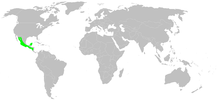Balmea
| Balmea stormae | |
|---|---|
| Scientific classification | |
| Kingdom: | Plantae |
| Clade: | Angiosperms |
| Clade: | Eudicots |
| Clade: | Asterids |
| Order: | Gentianales |
| Family: | Rubiaceae |
| Subfamily: | Cinchonoideae |
| Tribe: | Hillieae |
| Genus: | Balmea Martinez |
| Species: | B. stormae |
| Binomial name | |
| Balmea stormae Martinez | |
 | |
Balmea is a monospecific genus of flowering plants in the Rubiaceae family. The genus contains only one species, viz. Balmea stormae, which is found in El Salvador, Guatemala and Mexico (Nayarit, Jalisco, Colima, Guerrero, Michoacán, Chiapas).[1] It is locally known as ayuque. The plant is picked for its scarlet flowers, and the whole plant is sold on Mexican markets as a Christmas tree. Because populations are depleted as soon as they are discovered, this species is threatened with extinction.
Description
The plant is a shrub of four to seven meters. The smooth, greenish purple bark peels off in irregular thin shreds. The hard wood is whitish. The broadly ovate and shortly acuminate leaves are clustered at the end of the branches. The shrub flowers from August to October and the hermaphroditic flowers are scarlet-red, tinged with purple. When fully open they turn dark purple and at night a sweet scent emanates from them. The fruits ripen from December to January and are erect capsules, about 25 mm long that open at the tip in two follicle-like portions. The numerous seed show reticulate wings of about 4 mm.[2]
Taxonomy
The genus is named in honor of botanist Juan Balme and the species name honors Marian Storm, a collaborator of the describer.[2] The genus is closely related to Cosmibuena and Blepharidium.[2]
References
- ↑ Davidse, G., M. Sousa Sánchez, S. Knapp & F. Chiang Cabrera. 2012. Rubiaceae a Verbenaceae. 4(2): i–xvi, 1–533. In G. Davidse, M. Sousa Sánchez, S. Knapp & F. Chiang Cabrera (eds.) Flora Mesoamericana Missouri Botanical Garden Press, St. Louis.
- ↑ 2.0 2.1 2.2 Martinez M (1942). "A new genus of Rubiaceae from Mexico". Bulletin of the Torrey Botanical Club 69 (6): 438–441. doi:10.2307/2481425.